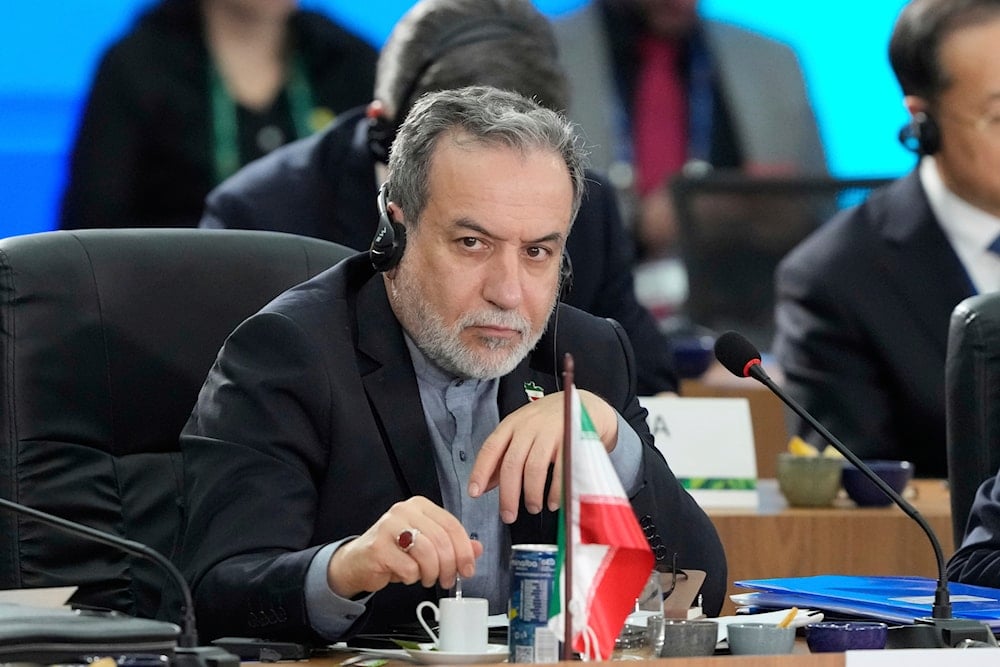Turkish and Iranian FMs discuss nuclear file at BRICS summit
Ankara signals readiness to support diplomatic efforts on Iran's nuclear program as regional and bilateral issues take center stage at the BRICS summit.
-

Iranian Foreign Minister Abbas Araghchi attends the 17th annual BRICS summit in Rio de Janeiro, on July 6, 2025. (AP)
Turkish Foreign Minister Hakan Fidan met with his Iranian counterpart, Abbas Araghchi, on the sidelines of the BRICS summit in Rio de Janeiro to discuss developments related to Iran’s nuclear program, according to Sputnik, citing a source from the Turkish Foreign Ministry.
Representing President Recep Tayyip Erdogan at the summit, Fidan held talks that went beyond the nuclear file to include a range of bilateral and regional issues of mutual concern. The source underscored that Turkey remains committed to diplomacy, stating the country is "prepared to offer any support possible for constructive steps" toward regional stability.
The meeting reflects Turkey's continued efforts to position itself as a mediator and stabilizing actor amid growing tensions.
Lavrov reaffirms Russia’s stance against attacks on Iran
In a separate meeting on the sidelines of the summit, Russian Foreign Minister Sergey Lavrov also held talks with Araghchi, reaffirming Moscow’s condemnation of attacks on Iranian territory, particularly those targeting its peaceful nuclear infrastructure.
Russia has repeatedly emphasized the importance of respecting Iran’s sovereignty and ensuring that international engagement on nuclear issues proceeds through diplomatic and legal frameworks.
The diplomatic engagements at the BRICS summit highlight the growing role of the multilateral bloc in addressing sensitive regional issues, particularly those involving member and observer states.
Araghchi mourns Iranians killed by 'Israel' in BRICS speech
At the BRICS summit, Araghchi delivered a moving speech where he mourned the Iranians killed by the recent Israeli aggression on Iran.
He expressed gratitude to fellow BRICS members who recognized the seriousness of recent escalations and condemned the aggression, detailing the destruction of residential areas, military sites, and civilian infrastructure.
The attacks, he said, resulted in the deaths of off-duty soldiers, scientists, university professors, and civilians, including women and children.
Particularly alarming, he noted, was the targeting of Iran’s peaceful nuclear facilities, which are under strict International Atomic Energy Agency (IAEA) oversight. The foreign minister accused the US of direct involvement in the strikes, reinforcing its complicity in what he described as "Israel’s" broader campaign of occupation, apartheid, and regional destabilization.
He warned that these attacks not only inflicted human and infrastructural damage but also delivered a "lethal blow" to diplomacy and the international rule of law, occurring just days before a scheduled round of nuclear talks between Iran and the United States.
Calling for international accountability, the top Iranian diplomat urged BRICS leaders to recognize the dangerous precedent set by what he described as unprovoked, lawless aggression by two nuclear-armed states.
BRICS leaders demand ceasefire in Gaza, condemn strikes on Iran
Leaders of the BRICS bloc, comprising 11 emerging economies, issued a strong and unified call on Sunday for an immediate, permanent, and unconditional ceasefire in Gaza, as the war enters its 22nd month.
In the final declaration of their summit held in Rio de Janeiro, BRICS leaders urged all parties to engage in good-faith negotiations to halt the war on Gaza and demanded a full withdrawal of Israeli forces from the Strip and all other parts of the occupied Palestinian territories.
"We exhort the parties to engage in good faith in further negotiations to achieve an immediate, permanent and unconditional ceasefire," the 11-nation bloc said in a final summit statement.
The statement comes as indirect truce negotiations between the Israeli occupation and Hamas resumed in Doha, with international pressure mounting for a resolution to the war.
The summit also addressed the recent escalation between Iran and "Israel", during which the latter launched an unprovoked 12-day war on the Islamic Republic, culminating in US airstrikes on Iranian nuclear facilities in June.
"We condemn the military strikes against the Islamic Republic of Iran since June 13, 2025," the statement read, without directly naming the United States or "Israel".
It added, "We express serious concern over deliberate attacks on civilian infrastructure and peaceful nuclear facilities, which constitute a violation of international law."

 4 Min Read
4 Min Read










